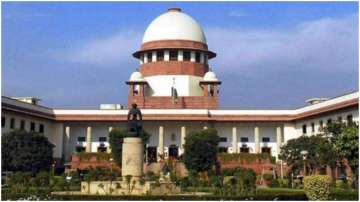SC fixes Aug 31 as new deadline for judgement in Babri Masjid demolition case
The Supreme Court Friday extended by three months the time for completion of trial in the 1992 Babri Masjid demolition case involving BJP veterans L K Advani, M M Joshi and Uma Bharti and said that judgement should be delivered by August 31.

The Supreme Court Friday extended by three months the time for completion of trial in the 1992 Babri Masjid demolition case involving BJP veterans L K Advani, M M Joshi and Uma Bharti and said that judgement should be delivered by August 31. The top court asked special judge S K Yadav to control the proceedings in accordance with the law so that inordinate delay that is beyond the time-frame is no longer breached.
It indicated to the special judge to avail the facilities of video conferencing to complete recording of evidences and hearing of applications that are filed during the course of trial proceedings.
A bench of Justices R F Nariman and Surya Kant, hearing the matter through video conferencing, passed the orders on receiving a letter from the special judge seeking extension of time granted to him for completing the trial in the politically sensitive case.
“Having taken the letter dated May 6, 2020, into consideration, we extend the period to complete evidence and deliver judgment till August 31, 2020. We are cognizant of the fact that Shri Yadav is making all efforts in order that the trial reaches a just conclusion. However, given the original time frame and the extended time frame, the effort must now be to complete the proceedings and deliver judgment latest by August 31, 2020,” the bench said in its order.
On July 19 last year the top court had asked the special judge to deliver the verdict within nine months, which was to end this April.
The bench on Friday said that despite nine months having expired from the aforesaid date (July 19), “we still find, on a perusal of the letter dated May 6, 2020, written by Shri Yadav, Special Judge that even the evidence is not yet completed”.
It said, “We may indicate that video conferencing facilities are available and should be used by Shri Yadav in order to complete all evidence as well as applications that may be filed in that behalf. It is up to Shri Yadav to control the proceedings in accordance with law so that inordinate delay that is beyond the time frame that we now give is no longer breached”.
The top court had on July 19 last year also extended the tenure of the special judge at Lucknow till the completion of the trial and the delivery of verdict in the case.
Besides Advani, Joshi and Uma Bharti, the accused against whom conspiracy charge was invoked in the case by the Supreme Court on April 19, 2017, include former Rajasthan governor Kalyan Singh, BJP MP Vinay Katiar and Sadhvi Ritambara.
Three other high-profile accused Giriraj Kishore, and Vishwa Hindu Parishad leader Ashok Singhal and Vishnu Hari Dalmia died during trial and the proceedings against them have been abated.
Kalyan Singh, during whose tenure as chief minister of Uttar Pradesh the disputed structure was razed, was put on trial in September last year after his tenure as Governor came to an end.
The top said last July that recording of evidence in the politically sensitive case should be completed within six months and the judgement in the case should be ready and delivered maximum within a period of nine months.
Exercising its plenary powers under Article 142 of the Constitution, the top court had directed the Uttar Pradesh government to pass appropriate orders in consultation with the Allahabad High Court within four weeks to extend the tenure of the special judge, who was set to retire on September 30 last year.
The special judge had written a letter on May 25, last year to the apex court, seeking extension of two-year deadline for completion of the case and informed the court that he was set to superannuate on September 30, 2019.
On April 19, 2017, the top court had ordered day-to-day trial in the high profile case and directed the special judge to conclude it in two years’ time.
While dubbing demolition of the disputed structure as a "crime" which shook the "secular fabric of the Constitution", it had allowed the CBI's plea on restoration of criminal conspiracy charge against the VVIP accused.
The court had come down heavily on the CBI for the delay of over 25 years in the trial.
Issuing a slew of directions, it had said, "The proceedings (against Advani and others) in the court of the Special Judicial Magistrate at Raebareli will stand transferred to the Court of Additional Sessions Judge (Ayodhya Matters) at Lucknow."
"The court of sessions will frame additional charges under Section 120-B (conspiracy) and the other provisions of the penal code mentioned in the joint charge sheet filed by the CBI against Champat Rai Bansal, Satish Pradhan, Dharam Das, Mahant Nritya Gopal Das, Mahamadleshwar Jagdish Muni, Ram Bilas Vadanti, Vaikunth Lal Sharma and Satish Chandra Nagar," the apex court had said.
The court had termed the Allahabad High Court's February 12, 2001 verdict dropping conspiracy charge against Advani and others as "erroneous".
Before the 2017 verdict of the apex court, there were two sets of cases relating to the demolition of the disputed structure on December 6, 1992 going on at Lucknow and Raebareli.
The trial of the first case involving unnamed 'Karsevaks' was going on in a Lucknow court, while the second set of cases relating to the eight VVIPs were going on in a Raebareli court.